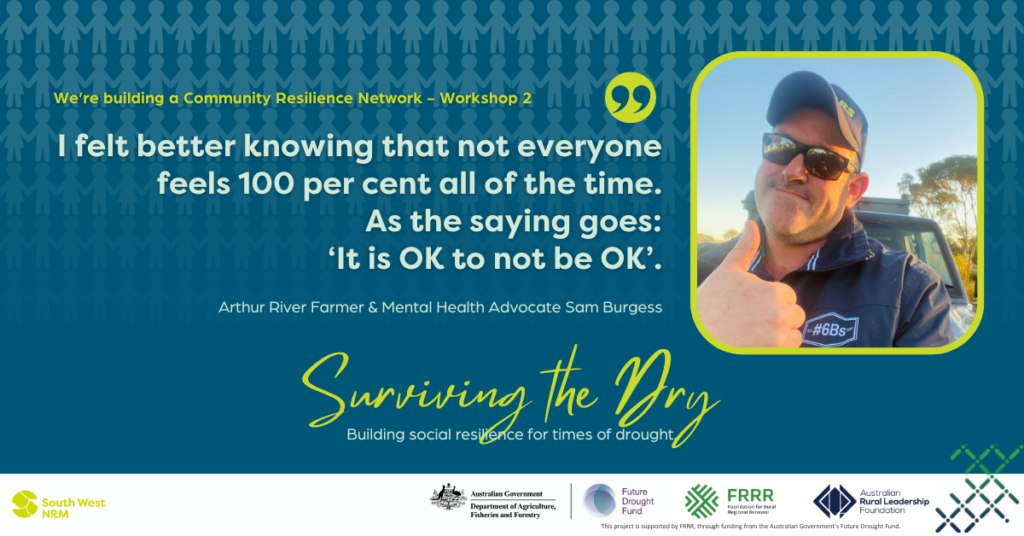
A sheep farmer who recovered after his mental health “hit rock bottom” leading him to become an advocate on the importance of connecting rural communities, will lead the second event in a series designed to prepare South West communities for a predicted increase in drought events.
Sam Burgess recalled the deep, dark hole he found himself in back in 2016 after four years of farming, an ordinary season, sheep he couldn’t sell and bills he couldn’t pay.
“I felt alone, too embarrassed to talk to anyone and it all just became too much,” he said.
Sam said unfortunately he hit rock bottom before deciding “enough was enough” and seeking help.
Australian Research in 2021 demonstrated an increase in psychological distress for the first 2.5-3 years of drought and with predictions drought months in the South West will increase by 80 per cent in the next 50 years, communities needed to prepare.
South West NRM is leading the charge with the recent launch of its new project to build a Community Resilience Network.
At the first workshop event last month, which included a presentation of research by the UWA Centre for Social Impact on the impacts of drought on entire communities, attendees spoke of the impact a drying climate was already having on farmers in their respective areas and a lack of mental health services in rural areas to offer effective support.
Manager Sustainable Agriculture Peter Clifton said the aim of the Community Resilience Network will be to improve capability and collaboration between organisations and groups to reduce harm.
To establish the network, community leaders and volunteers from a broad range of sectors across six South West shires have joined local working groups that will champion resilience building and support services.
Mr Burgess farms in Arthur River and will speak on dealing with stress and isolation at the second in a series of six planned workshops. He will share observations and insights based on his own uplifting story of recovery.
“Dealing with stress is normal, not unique, and it’s good to talk about it,” he said.
After all, it’s pretty normal to de-stress by talking to someone.
And if sometimes you needed to talk to someone trained to help you find the best solution, then that was ok.
South West NRM has partnered with CRCs throughout the region to assist with holding a series of six meetings between February and September, 2024 for anyone interested in helping their community.
The aim of the groups will be to:
- Increase community access to suitable support services, especially early intervention tools that help to build individual and community resilience;
- Share resources and learnings to develop partnerships across the region;
- Develop plans to further build community resilience.
Mr Clifton said: “The meetings are held online and at CRCs in Boyup Brook, Bridgetown, Donnybrook, Harvey, Brunswick and Manjimup.”
Workshop 2, with presentation by Sam Burgess, is on March, 2024 at 12pm for one hour. Participation is workshop 1 is not required for joining in workshop 2.
To find out more or register your interest in the Community Resilience Network get in touch with one of the CRCs listed above or contact Peter Clifton on 0409 680 900 or pclifton@southwestnrm.org.au
Future Workshops
- March 22 – Dealing with stress: Strengthening access to support. – Sam Burgess, #6Bs.
- May 3 – How can we develop a framework for community resilience? – Renee Knapp, Think Effective.
- June 14 – Financial Services. – Dean Bavich, Rural West; and Michael Monaghan, Farmanco.
- August 2 – Community health and well-being services. Roger Hitchcock, Rural Aid; and Terry Melrose, Regional Men’s Health.
- September 13 – How can we support Aboriginal and Youth in times of drought? – Kerry Collard, Goomburrup Aboriginal Corporation; and Lisa Burgess, Blackwood Youth Action.
This project is supported by FRRR, through funding from the Australian Government’s Future Drought Fund.
Sources:
New Insights Into the Relationship Between Drought and Mental Health Emerging From the Australian Rural Mental Health Study
https://www.frontiersin.org/journals/psychiatry/articles/10.3389/fpsyt.2021.719786/full
South West Western Australia Drought Resilience Situational Analysis
